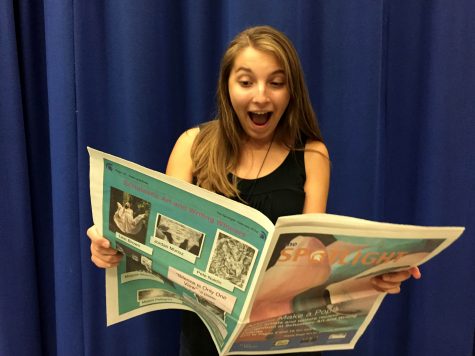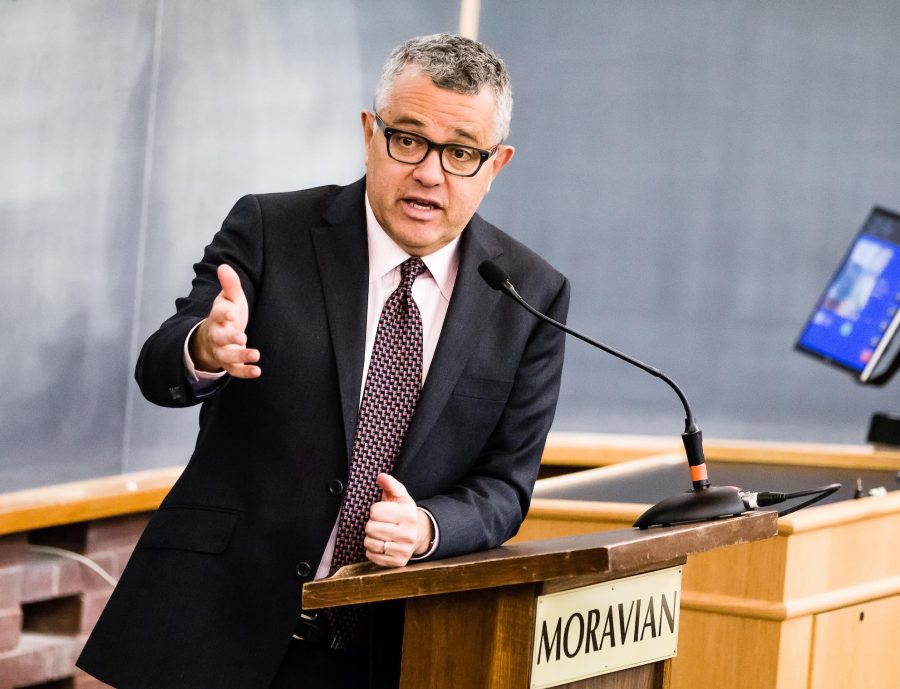A chat with CNN Senior Legal Analyst Jeffrey Toobin
As we drift further away from Election Day and move towards the inauguration of President-elect Donald J. Trump on January 20, 2017, the United States is preparing to face one of the most controversial administrations yet. Though the campaign is long over, it is important to reflect on the circumstances that surrounded Mr. Trump’s election when looking towards the future.
Earlier this fall, in October just prior to the presidential election, I had the chance to meet the Senior Legal Analyst for CNN Worldwide, Mr. Jeffrey Toobin, when he visited Moravian College to give a lecture. In addition to working for CNN, Mr. Toobin is a staff writer for The New Yorker and a published author of several award-winning books, his most recent being “American Heiress: The Wild Saga of the Kidnapping, Crimes and Trial of Patty Hearst.” His lecture at Moravian, “The Supreme Court in the Post Obama Age,” covered the history of the Supreme Court, its evolution throughout our country’s different presidential administrations, and finally, looking into the future Presidency. Prior to the lecture, I sat in on a student seminar and press opportunity where I listened to other students’ questions for Mr. Toobin and asked some of the my own. Here are some of the highlights:
Q: If Donald Trump is elected President and appoints a conservative Supreme Court Justice, what does this mean for important topics such as gay marriage and abortion rights?
Toobin: It would be unlikely [for these court cases to be overturned just from the replacement of Justice Scalia. The Supreme Court, by a vote of 5:3, with Justice Kennedy joining the liberals, said it was unconstitutional [to prevent women from receiving an abortion.] Scalia would only be a fourth vote (5:3), against abortion rights. [However,] Ruth Bader Ginsburg is part of the liberal jury. If she left and Trump replaced her with a Republican, you would see a threat to Roe v. Wade [a decision that] said that no state could ban abortion completely. If that were overturned, what would happen is the issue would return to the states. In a lot of red states they would pass laws outlawing abortion. In many blue states there wouldn’t be any change at all. It would be a huge battle in [swing] states like Pennsylvania, Missouri, Georgia, where there is a close balance.
Q: Donald Trump has said that he wishes to ban Muslims from the United States. For Muslim students currently studying in the United States, should they be concerned?
Toobin: If I were a Muslim student I would be very concerned. There has never been a purely religious quote in immigration, and Trump has been all over the map about what this proposal will be. He originally said no Muslims in the country. That certainly couldn’t happen. Then he said no Muslims who are not citizens. Then he said no people who come from Muslim countries with a history of terrorism. The dimensions of his proposal are very unclear. You cannot pass a law that targets a specific religion. But you can tighten immigration in general. You can limit immigration from Egypt, Syria, Pakistan, Afghanistan, and Saudi Arabia. I do think that if Trump is elected there will be less immigration in one way or the other and there will be more expulsion of people [from] the country than there has been [in the past].
Q: What has it been like covering the Donald Trump campaign from a journalistic perspective?
Toobin: I think we in the news media are going to spend a lot of time thinking about our role in the Trump campaign. There’s a paradox there. The Trump campaign began with the tremendous coverage that he received during the primaries, which had an impact in his getting the nomination. In the last two months [prior to the election] there has been this tremendous onslaught of coverage. Most of the critical coverage has been factually accurate, but I think he got a free ride for some time. The other republicans were also afraid though, and they have to take some of the blame. Everyone was convinced his support would waive away in the primaries, and it never did. I have never been involved in a presidential campaign where the news media played such a complicated role. Look at the last two [elections]. Candidates always complain about their [coverage]. But I don’t think anyone looking back would say the media had a giant role, but this is different. I think it will be very interesting to see after the campaign is over.
Q: How will the political atmosphere change with the next generation?
Toobin: I think there are certain areas where the impact is clear. The one that jumps out at me is gay rights. Equal rights for gay people is not going to be a controversial subject as time passes because the millennial generation has grown up with an understanding of it. I think sometimes we can forget what a huge change that is. It was only 2003 when the first state allowed same-sex marriage and it was hugely controversial. A year and a half ago when the Supreme Court said that [it was legal in] all 50 states, it was barely even all that controversial, and now it has fallen out of the political discourse. That’s an example of how the millennial generation will have an impact. The other stuff… it’s hard for me to say. You have the biggest stake when it comes to climate change. But I have seen no particular signs that the millennials are fixated on climate change. If Miami Beach is swallowed up by the Atlantic Ocean, it makes every other issue very trivial. I just think that issue dwarfs all the others. It isn’t an issue I am knowledgeable about, but we have an entire political party that doesn’t even acknowledge that it exists. Even if you have a political will to address it, if I were starting my career as a citizen, just someone who votes, and I had just turned 18 and was looking forward to having a country that somewhat resembles the one we have now, I’d be thinking a lot about climate.
Q: What sort of legacy will President Obama leave behind when he steps down from office this January?
Toobin: History is going to be good to Barack Obama. Think about the last group of two term presidents in the political campaigns. George W. Bush in 2008 was so bad that John McCain told him, “Don’t campaign for me.” Bill Clinton was told not to campaign for Al Gore. Hillary Clinton wants Obama to campaign for her. Think about the fact that he took office when the economy was in the greatest economic collapse since the 1930s, we were in two wars, there was a huge financial scandal in the financial sector, and gay rights was in its political infancy. The economy is so much better, the wars are basically over for the United States, the automobile industry is fine, gay rights is dramatically different than it was eight years ago. He has a had a presidency without any scandals to speak of. As a human being he has set a personal example with his family that I think will stand the test of time very well.

Throughout her four years at Southern Lehigh High School, Talia Trackim has surely established herself as the girl who does it all. She joined the Spotlight...


